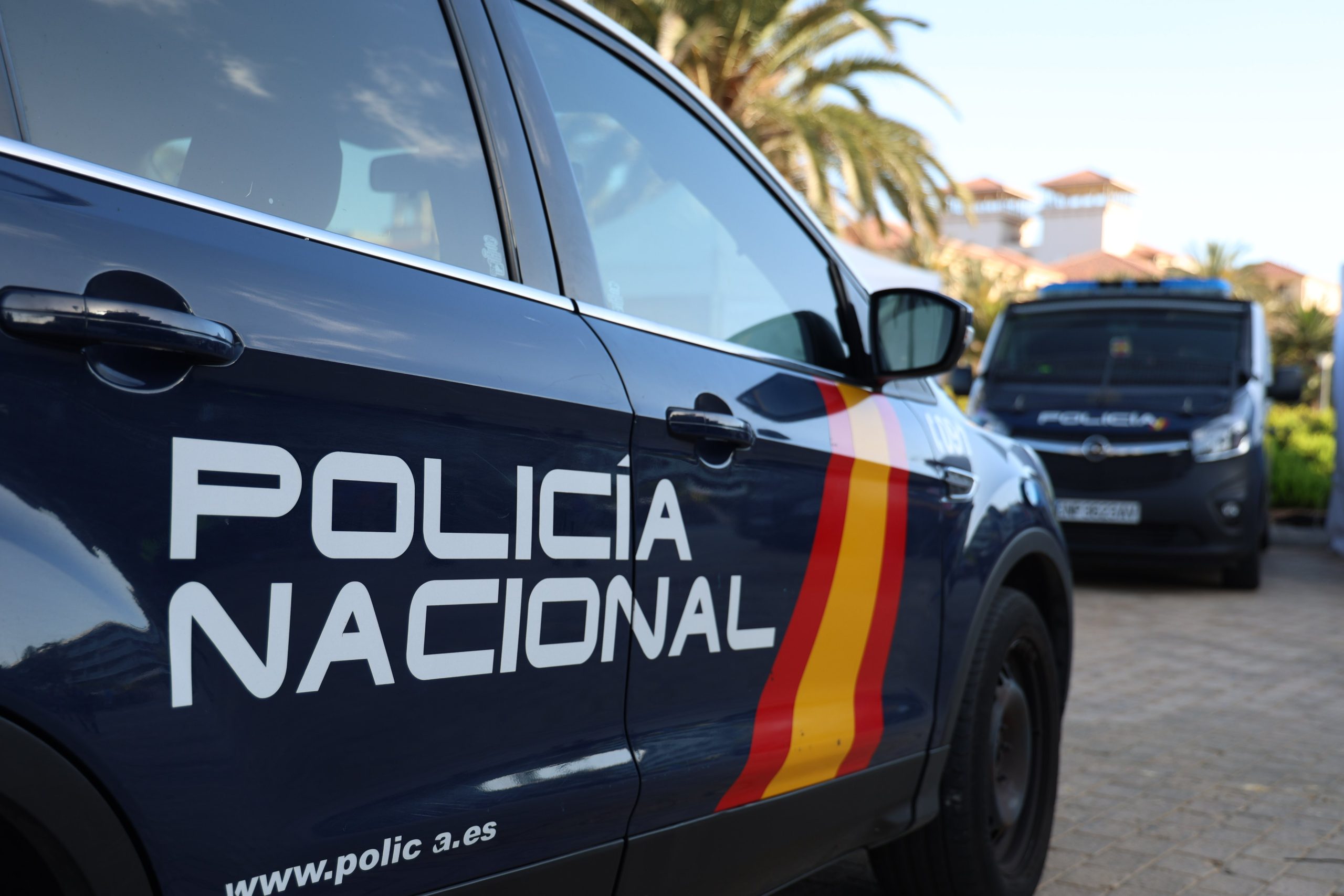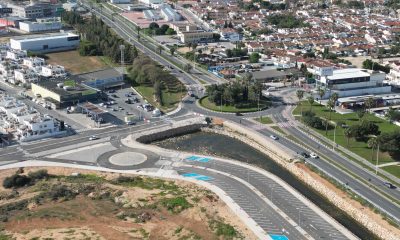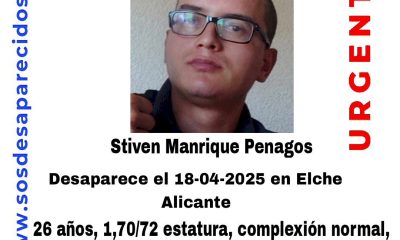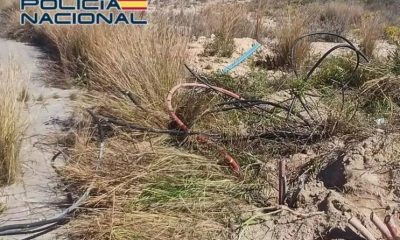Costa Blanca
The work of ONCE guide dogs is explained to the people of Benidorm

The public was shown how these animals are utilised to become essential components of blind people’s safety and autonomy during an exhibition hosted by the ONCE Guide Dog Foundation (FOPG) in Benidorm yesterday, Thursday 27th March.
Under the theme “Much more than a dog,” the nearly 1,000 participants, who came from various Benidorm educational institutions and the general public, watched as these animals performed a variety of obedience and focus exercises alongside mobility instructors Rafael Almansa and Eloy Aranda. They were accompanied by Tibor, a black Labrador, and Dior, a sable-coloured German Shepherd.
Guide dog users from Alicante, María Luz Menéndez and Moisés Moreno, described their everyday lives with ORI and ODRI, respectively, and both demonstrated on a circuit how the training process works so that the dogs can overcome obstacles, go up or down stairs, cross zebra crossings, look for doors, or stay in a cafe or in any kind of transportation at the feet of a blind person.
Antonio Pérez, the mayor of Benidorm and president of the Alicante Provincial Council; Enrique Llin, the president of the ONCE Territorial Council in the Valencian Community; Estela Medina, the director of ONCE in Alicante; and Francisco José Muñoz, the councillor for Public Space, Public Works, Accessibility, and Mobility of Benidorm, who wore an eye mask and experienced firsthand what it’s like to move without seeing, along with an ONCE guide dog.
The proper way to act around a guide dog
In addition to reviewing some guidelines for how to act around a guide dog, attendees had the chance to learn about the various phases a dog goes through to become the eyes of a blind person, including rearing, socialisation, training, everyday life, and retirement.
The first of them is that dogs should not be given any food since they may have a food intolerance, which could lead to digestive issues that could impair their health and well-being and interfere with their ability to help the blind person they are with on a regular basis.
They also reminded everyone that when walking with a blind person, which they are happy to do, it is crucial to avoid diverting the dog’s attention. This demands their focus to keep them safe.
Another piece of public advice is that people who own companion dogs should always keep them under control by their side and not let them go if a guiding dog is around.
Though it’s crucial to respect their work when guiding and save play and greetings for when they’re not wearing a harness, guide dogs also enjoy lots of downtime and leisure time.
Additionally, keep in mind that you should never tug on the dog’s leash or harness when giving instructions to a blind person. Just move away from the dog and approach them, ideally from their right side.
The legal right of guide dog owners to enter any locations, spaces, businesses, and public transportation in Spain with their dog was also recalled; this is a fact that occasionally creates issues because of public ignorance.
Over 3,700 canines have been given by the ONCE Guide Dog Foundation in its nearly 35-year history, and almost 1,000 of those dogs are currently strolling through our nation’s streets and villages with an equal number of blind people. Thirty of the 84 guide dogs in the Valencian Community—the eyes of the blind and visually impaired—live in Alicante. Every year, about 140 animals are supplied.
Strolling Together
The integration of blind persons into society is one of ONCE’s top concerns. This work is founded on three pillars: employment, social and cultural interactions, and personal autonomy.
In order to address this, she established the ONCE Guide Dog Foundation (FOPG), following the lead of North American and European guide dog schools. Its current facilities, which are located in Boadilla del Monte (Madrid), provide all services, including canine training and instruction, boarding, breeding, and puppy care, as well as a veterinary clinic, a shelter for retired dogs, and a training user housing.
The most popular breeds are German Shepherds and Labrador Retrievers, which are hypoallergenic crosses between Golden Retrievers and Giant Poodles. Like all of the services that ONCE provides to its users, this one is free. Depending on the animal’s developmental stage, training lasts 18 to 20 months before the animal is delivered to the user. In addition to dog trainers and teachers, foster families offer to socialise the puppies during the training process.
Discover more from Costa Blanca Daily
Subscribe to get the latest posts sent to your email.
Costa Blanca
Alicante couple arrested for trying defraud lottery winner out of 40,000€ with a fake 6€ ticket

In Alicante, National Police officers have arrested a 37-year-old man and a 42-year-old woman, who are purportedly involved in fraudulent activities. After successfully deceiving the proprietor into believing that the prize was only €6, the suspects attempted to cash in a lottery ticket valued at €40,000.
A citizen lodged a complaint alleging fraud, which prompted the investigation. She complained that she had acquired a lottery ticket and, the day following the drawing, visited a lottery kiosk to determine whether the ticket was eligible for a prize.
The seller informed her that the system was not functioning properly and that she could verify it using her mobile phone after verifying the ticket with the authorised ticket dispenser (POS). The vendor informed her that the ticket had a prize of six euros when she viewed it on the terminal.
For her part, the victim trusted the provided information and accepted the money without suspecting deception. At the same time, the seller retained the lottery ticket.
A few days later, the complainant discovered that the was infact worth 40,000 euros and that she had been deceived. She returned to the stand where she had checked the ticket to claim her prize, and the seller informed her that she was unaware of this and that she had thrown it in the bin.
Then, she proceeded to the authorised offices of the aforementioned lottery drawings to report the incident. Upon his arrival, she was instructed to submit a complaint regarding the events.
The agents verified that the coupon was indeed a prize after collecting all the information. The saleswoman confirmed on three separate occasions that she had retained the coupon after deceiving the complainant about the prize amount.
The investigation phase also disclosed that the lottery ticket had been attempted to be redeemed by the seller’s ex-partner. However, this was not accomplished due to the fact that the authorised collection offices were aware of the incident and the agents had requested that the payment of the prize be blocked.
The officers were able to corroborate that the seller and the individual who attempted to cash in the winning ticket were both involved in a fraudulent activity as a result of the investigations.
The investigators’ findings confirmed that the two suspects had reached an agreement to collect the winning ticket. They also discovered that the woman, a lottery seller, had deceived them by faking the malfunction of the POS machine and falsely informing the complainant that the prize was six euros.
Following the investigation and the collection of sufficient evidence to establish their involvement in the events, they were apprehended and charged with fraud.
The courts in Alicante were informed of the situation subsequent to the police investigation.
Discover more from Costa Blanca Daily
Subscribe to get the latest posts sent to your email.
Costa Blanca
Acquitted of fraud for keeping €75,000 deposit on Torrevieja house

The controversial failed sale of a home in Torrevieja in 2022 between two German citizens resulted in a judicial case. The Prosecutor’s Office and the private prosecution sought €77,000 in compensation and three years in prison for the defendant, the property owner, on the grounds that she had subsequently sold the house to another individual without returning the money paid.
Nevertheless, Orihuela Criminal Court No. 4 has granted the defendant’s acquittal, concluding that there was no criminal deception and that the facts should be resolved through civil proceedings.
The case was initiated by a failed private sale of a residence in the Los Balcones development in Torrevieja. The customer was unable to secure financing prior to the deadline stipulated in the contract. The public deed was never signed, despite the fact that €75,000 was paid in advance. The property was subsequently sold to third parties by the defendant, which resulted in the filing of a complaint for fraud.
Facts that have been verified
The defendant contacted the complainant in August 2022 to discuss the sale of the property. On August 13th, 2022, the defendant signed a reservation document, with a total price of €370,000 and a deed signing date of October 31st, 2022. She explicitly stated that the appointment with the notary would not be postponed beyond October 31st, 2022, and delivered over €3,000 in cash at that time.
The buyer and the spouse of the woman who has since been exonerated convened in Germany on August 21st to receive a cash payment of €57,000. Additionally, they consented to acquire the home furnishings for €4,000, with the injured party contributing €2,000 in cash.
The private sales contract was executed by the parties a week later. The initial stipulation of the contract required the buyer to pay €15,000 within three weeks. The transaction was finalised on August 30th, 2022. The complainant was awaiting financing for the remaining quantity of €295,000.
Similarly, the initial stipulation explicitly stated that “the remaining portion of the agreed price will be paid upon the signing of the public deed of sale.” The aforementioned signature is scheduled for October 31st, 2022. The deposit money would be forfeited in the event of the buyer’s cancellation, and it would be transferred to the vendor. Double the deposit would be reimbursed to the customer by the seller in the event of contract cancellation (Art. 1454 CC).
The defendant, who has since been acquitted, executed a deed of sale of the property to third parties on July 25th, 2023. There is no record of the return of the €75,000 she was claiming, and there is insufficient evidence that she did so without prior dissolution of the signed contract or notification to the complainant.
Nevertheless, the Court determined that the dispute did not satisfy the criteria of Article 251.2 of the Criminal Code, which required criminal deception, and classified it as a civil dispute.
In the ruling, the judge explicitly enquires, “Where is the deception that the type requires?” He notes that the buyer was informed that the property would be relisted if he failed to secure financing in a timely manner, which subsequently transpired.
In order to underscore that frauds that are subject to Article 251 of the Criminal Code must also entail a minimum level of deceptive manoeuvring, the ruling incorporates updated references from the Supreme Court, such as the most recent Supreme Court ruling, 631/2024.
The judge in this instance has determined that “a failed sale as a result of insufficient financing cannot be criminalised.” María Barbancho Saborit, the defendant’s attorney, stated, “These types of rulings reinforce the notion that not all economic disputes are criminal.” “It is imperative to distinguish between breaches of contract, which are inherent in civil matters, and truly criminal conduct and preserve the presumption of innocence.”
The decision is not conclusive and may be appealed to the Alicante Provincial Court. Numerous witnesses, including those from the vendor, the defendant’s family, and professionals involved in the purchase and sale process, were presented during the trial, in addition to a substantial amount of documentary evidence.
Discover more from Costa Blanca Daily
Subscribe to get the latest posts sent to your email.
Costa Blanca
Easter traffic operation ends with at least 22 deaths

It starting at 15:00 on Friday April 11th, the special traffic operation for Holy Week and ended at midnight last night. A minimum of 22 individuals have died on the roads in Spain.
According to data from the General Directorate of Traffic, there were 21 fatal incidents on the intercity road network as of 8 p.m. on Easter Sunday, resulting in 22 fatalities.
Last year, 28 individuals lost their lives on the highways during the entire Holy Week.
Discover more from Costa Blanca Daily
Subscribe to get the latest posts sent to your email.
-

 Costa Blanca2 days ago
Costa Blanca2 days agoTorrevieja fails to comply with its commitment to open new road at La Hoya for Easter
-

 Costa Blanca1 week ago
Costa Blanca1 week agoTorrevieja records a 2.8 magnitude earthquake
-

 Costa Blanca2 weeks ago
Costa Blanca2 weeks agoSpanish family killed in helicopter crash in New York
-

 Costa Blanca2 weeks ago
Costa Blanca2 weeks agoA car fire on the Orihuela Costa is promptly extinguished by firefighters
-

 Costa Blanca1 week ago
Costa Blanca1 week agoThe Alicante Tourist Board website now available in seven languages
-

 Costa Blanca5 days ago
Costa Blanca5 days agoArrested in Murcia for activities linked to jihadist terrorism
-

 Costa Blanca2 weeks ago
Costa Blanca2 weeks agoElche residents rescued after a fire caused by an electric scooter
-

 Costa Blanca2 weeks ago
Costa Blanca2 weeks agoSuspect held for the murder of John George extradited to a Spanish prison












